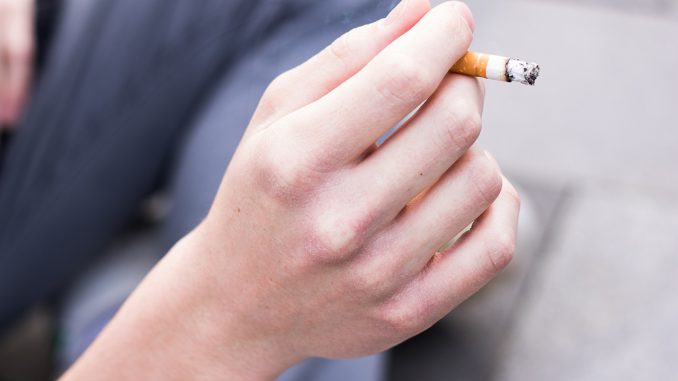
Temple University’s tobacco-free campus policy could save it thousands of dollars, mitigating some costs associated with cleaning up littered cigarette butts.
Facilities and Management staff estimate the department spent $22,000 annually paying employees to remove cigarette butts from walkways and empty the disposal structures, according to the Smokefree Campus Task Force’s May 2018 report, which was released last week. Smoking areas and cigarette disposal structures are still available, but will be removed after July 1.
The university will ban all tobacco products, including nicotine delivery devices like Juul, on all of its United States campuses by Fall 2019. For now, the university’s current policy prohibiting smoking within 25 feet of campus building entrances will still be enforced.
The receptacles were not keeping people from littering the butts, said College of Public Health Dean Laura Siminoff, who led the task force. Instead, they encouraged people to gather and smoke, and more than half of the receptacles are within 25 feet of building entrances and operable windows, according to the task force report.
The smoke-free policy’s main goal is to improve the Temple community’s respiratory and cardiovascular health, said Jennifer Ibrahim, the associate dean for academic affairs at the CPH and a member of the task force. People experience health benefits as early as 48 hours after going smokefree, she added. Also, the policy intends to decrease pollution.
Cigarette butts on Main Campus walkways leak chemicals into nearby stormwater drains, disrupting filtration.“The cost of pulling [cigarettes] out is really expensive,” she said.
Tobacco use is the leading cause of preventable death in the U.S., the task force’s report states, and the CPH hopes to see long-term, improved student, faculty and staff health and lower insurance costs for them and the university as a result, Siminoff said.
“It will save money for everyone, especially students when they get their own health insurance policies,” she added. “Because they’re healthier and they don’t smoke, those policies will be cheaper.”
The policy is not intended to punish people for smoking, but to provide help to individuals who currently smoke and want to quit, Ibrahim said.
“What people are calling pushback, we’re calling it feedback,” Ibrahim said. “We want to hear what people have to say about our policy so that unlike the previous policy, we can do a better job enforcing it.”
The task force conducted an observational study between October 2017 and March 2018 that found more than half of people seen smoking on campus were less than 25 feet from building entrances, violating the university’s current policy.
The task force is holding a contest for students to design graphics for tobacco-free signs and advertising on campus, and the winning submission could be featured as the policy’s signature logo. The design will be chosen by the end of the semester, Siminoff said.
“The idea is not to find and slap tickets on people, the idea is for compassionate enforcement,” she said.



Diana, Good reporting. Enjoyed your writing and am pleased by the university’s decision. Bravo Temple